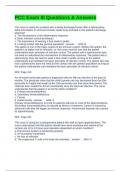-
1. Exam (elaborations) - Pcc exam 1 the nursing process questions & answers
-
2. Exam (elaborations) - Pcc practice questions & answers
-
3. Exam (elaborations) - Pcc 1 exam #1 questions & answers
-
4. Exam (elaborations) - Pcc exam 1 blueprint questions and answers
-
5. Exam (elaborations) - Pcc exam 1 questions & answers
-
6. Exam (elaborations) - Pcc final exam study guide questions & answers
-
7. Exam (elaborations) - Pcc, exam 2 questions and answers
-
8. Exam (elaborations) - Pcc final exam questions & answers
-
9. Exam (elaborations) - Pcc exam 1 highlights sheet questions & answers
-
10. Exam (elaborations) - Pcc, final exam questions and answers
-
11. Exam (elaborations) - Pcc level 1 questions and answers
-
12. Exam (elaborations) - Pcc research questions & answers
-
13. Exam (elaborations) - Pcc exam 1 questions and answers
-
14. Exam (elaborations) - Pcc exam 3 practice questions and answers
-
15. Exam (elaborations) - Nurse 234 patient-centered care concept (pcc) questions & answers
-
16. Exam (elaborations) - Pcc 2 exam 1 questions and solutions
-
17. Exam (elaborations) - Pcc exam iii questions & answers
-
18. Exam (elaborations) - Pcc chapter 1 study guide questions and solutions
-
19. Exam (elaborations) - Pcc exam 1- unmc questions & solutions
-
20. Exam (elaborations) - Unit 3 test hit, pcc, healthcare organizations questions and answers
-
21. Exam (elaborations) - Pcc exam 2 questions and answers
-
22. Exam (elaborations) - Pcc exam #2 questions and answers
-
23. Exam (elaborations) - Pcc/pcis questions and answers
-
24. Exam (elaborations) - Icf's pcc markers questions and solutions
-
25. Exam (elaborations) - Pcc unit 3 questions and solutions
-
26. Exam (elaborations) - Pcc anatomy week 1 questions & answers
-
27. Exam (elaborations) - Pcc exam 2 questions and answers
-
28. Exam (elaborations) - Pcc chapter 4 assessment questions and answers
-
29. Exam (elaborations) - Pcc hi-101 history of civ. test 2 questions and answers
-
30. Exam (elaborations) - Pcc – mobility questions and answers
-
31. Exam (elaborations) - Pcc hi 101 test 1 questions and answers
-
32. Exam (elaborations) - Pcc iii final exam questions and answers
-
33. Exam (elaborations) - Medical terminology (pcc) questions and answers
-
34. Exam (elaborations) - Icf pcc markers questions and answers
-
35. Exam (elaborations) - Pcc 274- exam 1 questions and answers
-
36. Exam (elaborations) - Pcc ii exam 3 questions and solutions
-
37. Exam (elaborations) - Pcc unit 5 questions and answers
-
38. Exam (elaborations) - Pcc- quiz 1 pain questions and answers
-
39. Exam (elaborations) - Pcc 2 exam 3 questions & answers
-
40. Exam (elaborations) - Pcc astronomy exam #1 review questions and answers
-
41. Exam (elaborations) - Pcc en 210 intro to literature midterm questions and answers
-
42. Exam (elaborations) - Pcc bi 234 briggs exam 1 questions and answers
-
43. Exam (elaborations) - Pcc exam 2 questions and solutions graded a+
-
44. Exam (elaborations) - Art history test 1 pcc questions with correct answers
-
45. Exam (elaborations) - Ladotd pcc plant inspection questions and answers
-
46. Exam (elaborations) - Corrections theories- pcc, rnr, glm questions and answers
-
47. Exam (elaborations) - Pcc questions and answers
-
48. Exam (elaborations) - Pcc exam 1 questions and answers
-
49. Exam (elaborations) - Hsc-110 final review questions & answers correct
-
50. Exam (elaborations) - Pcc-unit 1 questions & answers correct
-
51. Exam (elaborations) - Pcc 274 exam 1 questions and answers
-
52. Exam (elaborations) - Pcc chapter 3 [mhs] questions and answers
-
53. Exam (elaborations) - Possible pcc test 1 questions and answers
-
54. Exam (elaborations) - Pcc blet 121-course orientation questions and answers
-
55. Exam (elaborations) - P.c.c. flashcards questions and answers
-
56. Exam (elaborations) - Pcc chapter 5 study guide questions and answers
-
57. Exam (elaborations) - Pcc 302 exam 1 questions & answers
-
58. Exam (elaborations) - Pcc 201 exam 1 questions and solutions
-
59. Exam (elaborations) - Percentage of consonants correct (pcc) questions and answers
-
60. Exam (elaborations) - Pcc unit 1 questions and answers
-
61. Exam (elaborations) - Final – pcc questions and answers
-
62. Exam (elaborations) - Pcc1 exam 1 questions and answers
-
63. Exam (elaborations) - Pcc business law (dossin) questions & answers
-
64. Exam (elaborations) - Pcc final review questions and answers
-
65. Exam (elaborations) - Pcc emt block 1 questions and answers
-
66. Exam (elaborations) - Pcc fmtb-e questions and answers
-
Show more




